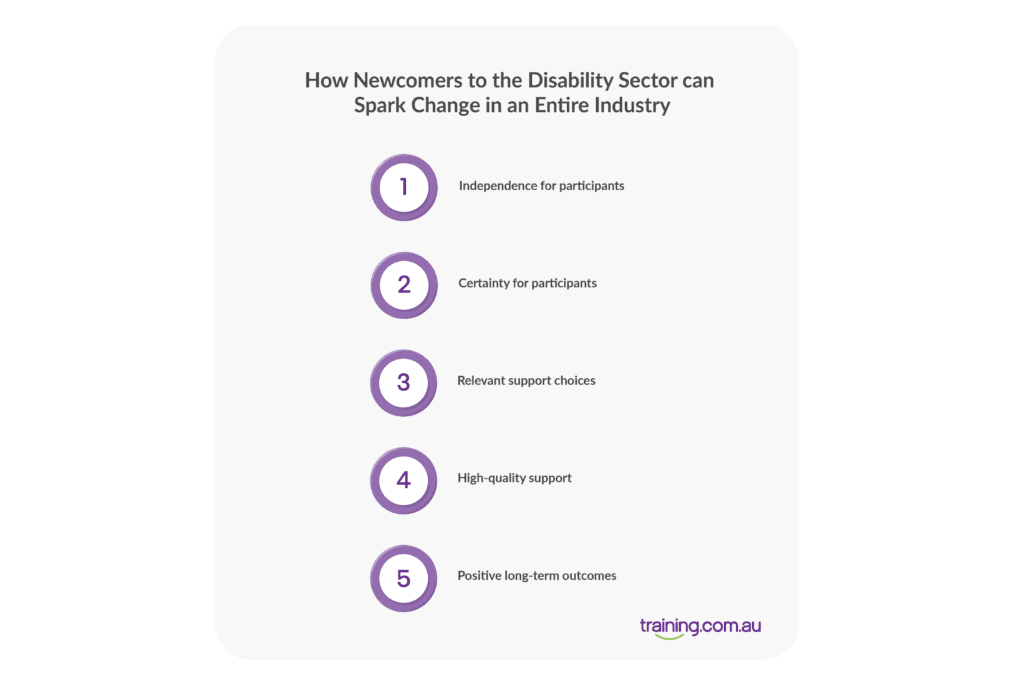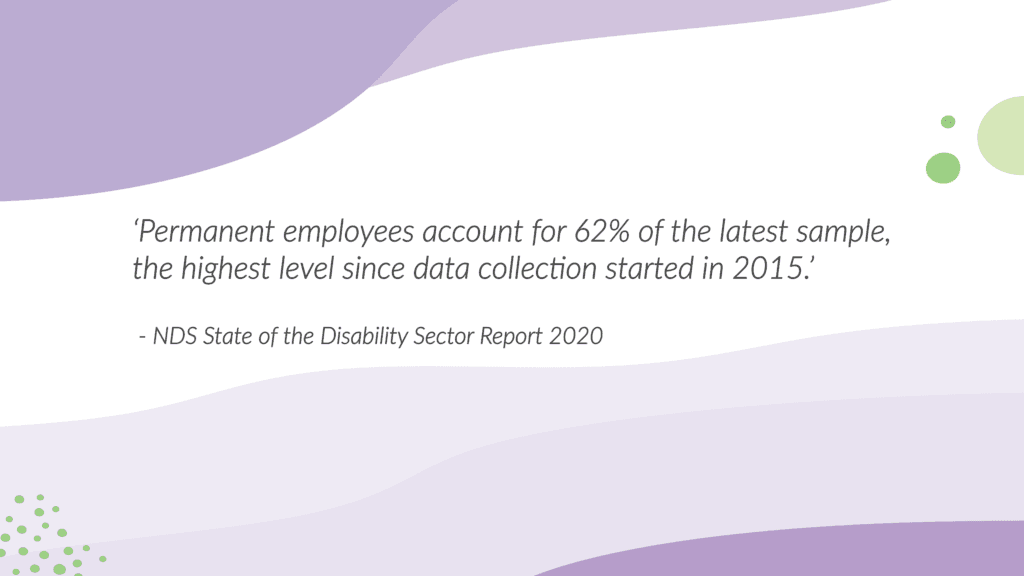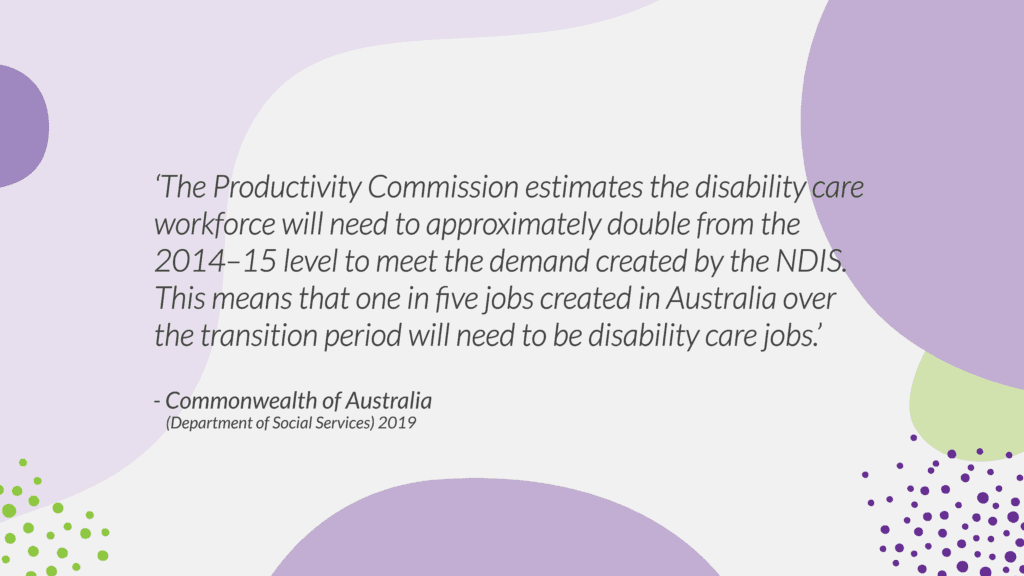In this post
How Newcomers to the Disability Sector can Spark Change in an Entire Industry
Published on May 11, 2021
Working as a disability support person is one of the most rewarding careers. No day is the same, you meet some incredible people from all walks of life, and you get to do things every day that positively affect others.
But, like many sectors, disability has had its challenges. Recent reports and surveys into the state of the industry suggest that change is needed for the disability sector to thrive and provide the quality care its clients deserve.
So what’s the problem?
After a turbulent year, the disability sector has coped remarkably well post-COVID-19, according to the 2020 State of the Disability Sector Report. However, other elements at play see the industry falling short, with 50% of small service providers either just breaking even or making a loss.
One key factor that is impacting the sector negatively has been the implementation of the NDIS (National Disability Insurance Scheme). The system is relatively new, with an objective to support those with a disability in making their own choices supporting the following:

Although created to improve on the former Australian system of disability care and support and revolutionise the experience for many people with disabilities, the new system has faced some serious teething problems and may still take some time to deliver consistently positive outcomes across the board.
How have problems affected key areas in the sector?
Participants:
The 2019 review of the NDIS Act presented to the Government found that for some participants, the transition to the new scheme felt confusing, lacked transparency and fostered an environment where they felt misunderstood and not an authority on their disability. Supporting those with disabilities is the very reason these systems are in place. If participants to the scheme are not all seeing the benefits, the NDIS is not working to its full potential.
Service providers:
As indicated in the CSI AnnualMarket Survey, while the NDIS continues its roll-out, there is widespread frustration around the administration processes, pricing issues and system inconsistencies. The impact to financial positioning of some service providers is another concerning discovery. Service providers are an essential cog in the disability service ‘machine’. Yet, these providers seem to have been hit hardest, translating into growth in service gaps and a weaker workforce in all areas. With the number of NDIS participants at almost 500,000, the sector report suggests that the number of disability workers needs to grow considerably to cope with the increased demand.
So this is good news, right? A sector singing out for more employees? Well, yes and no.
The application of the NDIS favours a highly casualised employment model. As explained in this ABC Hack article, funding through the scheme is directed in two streams — one of which goes directly to the client for ‘assistance with daily life’.
Care is allocated and used in short shifts, requiring support workers to be flexible. This means that it is more cost-effective for service providers to employ staff on casual contracts.
Understandably, the preference for an employee in this sector would be permanent employment, ensuring reliability and job security. The lack of this can mean some support workers are unable to apply for certain jobs and unable to pursue a career they love.
Encouragingly, NDS’s Workforce Census survey has found that a significant shift toward permanent employment took place in the latter half of 2019:

What we think needs to happen
Actions need to be taken by the Government in response to the NDIS Act review.
The review report made 29 recommendations to the Government to improve participants’ experience within the new NDIS system. The Government’s response to the review was positive.
They have committed to working closely with people who have disabilities and carers to ensure the NDIS provides consistent, quality services they need. With emergency COVID-19 response taking precedence momentarily, care needs to be taken to get back on track with improvements needed to support the sector.
Administration changes within the NDIS system.
As the sector report suggests, and our research reaffirms, there are some fundamental processes of the scheme and how it affects service providers that require a strong focus. Created to provide a vast list of services, the NDIS must be a system that all providers can exist in.
A reduction of red tape in the administration processes is vital to streamline processes for service providers. Prices need to change to reflect accurate estimates of service costs, an eye needs to be kept on service gaps, and providers need more access to account managers when in need of support.
Service providers need help in attracting quality allied health workers.
Working as a disability support person is the dream job for some people, but the issue of casualisation in the workforce needs to be further addressed. Support workers should feel confident when starting new roles within the sector, and career stability is the first step to achieve this. A balance between the customer’s needs and the requirements of workers for permanent/part-time roles needs to be met.
As suggested in the Hack article, one solution could be to give control of pricing to the free market instead of the prices set by the NDIA, which some believe are set too low. With careful attention paid to maintaining the annual budget, this could increase the hourly rate paid to support workers creating more security.
Improving the perceptions of a career in disability support.
Being able to witness and support remarkable people in overcoming challenges makes a role in disability one that guarantees enormous job satisfaction. We believe that the incredible opportunity to be part of this sector and its benefits should be shouted from the rooftops.
By raising more awareness around the positive aspects of these roles, making changes to the allocation of work, and taking growth opportunities more seriously, we will guide those who already have a strong calling to a career in disability support and encourage a much more robust workforce.
How can newcomers to the sector make positive change?
The NDIS has presented one of the most significant job creation opportunities in Australian history, with the sector in need of around 120,000 more workers.

This is an extraordinary opportunity for anyone considering a role in disability support to start their journey. Not only could you make a massive difference in a person’s life, but you could also be affecting change in an entire sector.
Newcomers to this sector have the advantage of entering with a clear, unbiased view of how the NDIS works and how they can train to fit in with the new system.
For those who wish to eventually hold more senior roles in the sector, potentially in decision-making positions from where direct improvements can be made, a fresh perspective could be what just when the sector needs.
Like any new major procedural overhaul, there will always be initial creases to iron out and disruptions to be solved. Through these reports, surveys and research findings, there is an acknowledgement that significant improvements need to be made to the NDIS system and a strong intention to do so.
With so many people committed to ensuring that the best care is available to those who need it, how wonderful it would be to be part of the change necessary to help improve the disability sector from the ground up.
Have you got the passion and courage to make a change in this crucial industry? Discover the training options that will arm you with the skills to make a difference.
Latest Articles
How to Apply for Work Placement: Tips & Resources
Congratulations! You’re about to embark on an exciting journey where you will practise and develop t...
11 Hobbies That Can Make You Money: Use Your Passion for Profit
Hobbies often get a bad rap. They’re seen as just a way to kill time, a mindless escape from t...
Is The Job You Hate Killing You? Why You Need to Make a Change
Do you hate your job? Studies show that staying in a job you hate has negative health effects and ev...
Want to read more?
How to Become a Web Developer
Looking at a career in web development? We dive into salary expectations, desired qualifications and...
How to Ace an Aged Care Job Interview
Got an aged care job interview lined up? Learn how to prepare and show the hiring manager you're a g...
How to Format Your Cover Letter [+ Examples]
Learn how to format your cover letter, and what you need to include. Use this example as a base to b...
